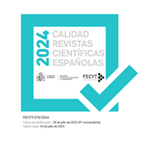Desautomatización fraseológica y humor verbal en español
Resumen
Los refranes, frases hechas y fórmulas rutinarias son unidades léxicas pluriverbales (Corpas Pastor, 1996) que muestran mayor fijación e idiomaticidad, lo que las convierte en marco ideal para insertar rupturas de la expectativa. El presente artículo aborda un conjunto de refranes desautomatizados, esto es, sometidos a variación, ruptura o desvío, con fines humorísticos. En el marco de las teorías de análisis del humor verbal tomamos las más recientes ampliaciones y aplicaciones al español de la Teoría General del Humor Verbal (Raskin & Attardo, 1991; Attardo, 2020) por parte de Ruiz Gurillo (2019). Analizamos los procedimientos empleados para desautomatizar algunos refranes en inglés y español: el orden de los constituyentes, variación de la categoría gramatical, modificación del número de elementos, sustitución de componentes (Montoro, 2005). Para el análisis de la desautomatización de refranes se consideran los trabajos de Veyrat Rigat (2008), Luque (2008), García Yelo (2012) e Illán Castillo (2021). Se observan patrones comunes en los tipos de ruptura en el plano lingüístico que confirman la tesis de Corpas Pastor (1996: 29) de que, cuanto más fija es la unidad fraseológica, más factible es que se la modifique en el discurso.
Descargas
Descarga artículo
Licencia
La revista Círculo de Lingüística Aplicada a la Comunicación, para fomentar el intercambio global del conocimiento, facilita el acceso sin restricciones a sus contenidos desde el momento de su publicación en la presente edición electrónica, y por eso es una revista de acceso abierto. Los originales publicados en esta revista son propiedad de la Universidad Complutense de Madrid y es obligatorio citar su procedencia en cualquier reproducción total o parcial. Todos los contenidos se distribuyen bajo una licencia de uso y distribución Creative Commons Reconocimiento 4.0 (CC BY 4.0). Esta circunstancia ha de hacerse constar expresamente de esta forma cuando sea necesario. Puede consultar la versión informativa y el texto legal de la licencia.











